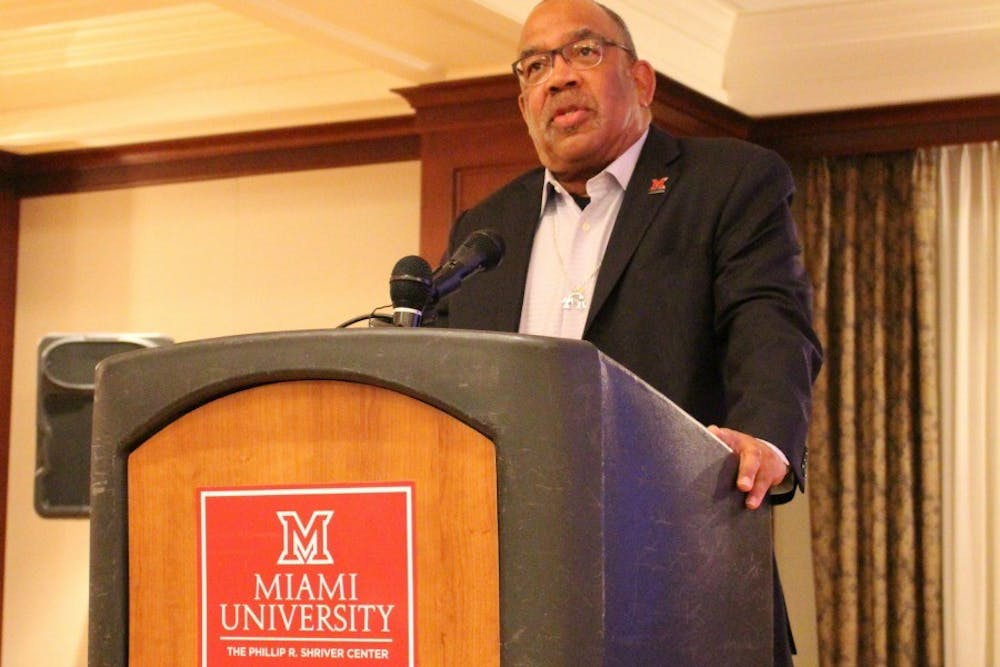By Morgan Nguyen, Senior Staff Writer
All seats were taken in the Heritage Room in Shriver last Thursday as members of the Miami University community and surrounding areas came to hear Judith Browne Dianis speak on a concept known as the "school-to-prison pipeline."
"This pipeline is a series of policies and practices that have led to harsh discipline against children," said Dianis, a civil rights attorney and co-director of the Advancement Project, a liberal non-profit civil rights organization based in Washington, D.C. "These babies' [schoolchildren] rights are being violated by a zero-tolerance policy. We're working on a movement for new codes of conduct."
The lecture was organized as part of the Robert E. Strippel Memorial Continuing Dialogue on Justice and Human Rights annual program. It was sponsored by over 20 organizations, both on and off campus, and coordinated by Mary Jane Berman, the director of the Center for American and World Cultures.
Dianis discussed causes of changing policies that are incarcerating students at a young age, including the war on drugs and the idea of some students as "super predators" that require preventative action. She talked about the existence of an implicit bias against black, urban schoolchildren most significantly.
"In school, implicit bias plays out in people's perception," Dianis said. "Black males are considered large and scary, and black females are sassy and wild. This leads to an idea that it's you, the teacher, versus them, the students."
A strong message in the lecture was equality in treatment of schoolchildren.
"The lecture centered around one important truth: all human beings are worthy of dignity, and should be treated equally," said sophomore Victoria Slabinski. "At the moment, African-American children are denied the love and respect that they deserve. This needs to change. Schools need to stop 'othering' and start building authentic, supportive communities."
Students in attendance also found Dianis' theories helpful.
"I like how she took various issues that seem coincidental, and showed how they're all connected," said first-year Miranda Woods. "You could see how they're all linked back to education and how students are being treated."
Dianis further argued that criminal codes aren't made to be enforced in school. School is supposed to be a nurturing environment. She said there was a definite racial divide in the causes of arrests and suspensions, saying blacks are usually disciplined for subjective actions - disobedience, disorderly conduct, while whites face mostly objective charges, such as drug possession.
She supported her assertions with statistics from local school systems, explaining that while the Cincinnati Public Schools are comprised of 63 percent black students, the expulsions are 96 percent black students.
"We live in a country where we think we have racial equality and we don't," said senior Morgan Floyd. "It was nice to hear statistics that support the lack of equality. I feel like she was saying some stuff that needs to be said, and should be out there more."
Woods saw a direct connection between the lecture and Miami.
"The most important take-away point is that we need more bias training, and not just for teachers," said Woods. "Across the board, there should be more bias training. It should be a part of the Miami Plan."
The solution Dianis proposed for reducing the pipeline is new or revised school codes of conduct written in collaboration among students, parents, police and school officials.
"You can't rely on the system that devalued you, to teach you your own value," said Dianis. "We need to start caring about our children. We will all be better if we all do better."
Students left impressed by the information Dianis presented.
"Some of the anecdotes about injustice were so shocking that I was left speechless," said Slabinski. "The overall impression I got was one of empowerment. Dianis spoke about some of her own successful reform efforts, and she challenged her audience to work toward positive change and check for prejudice in our own lives."

